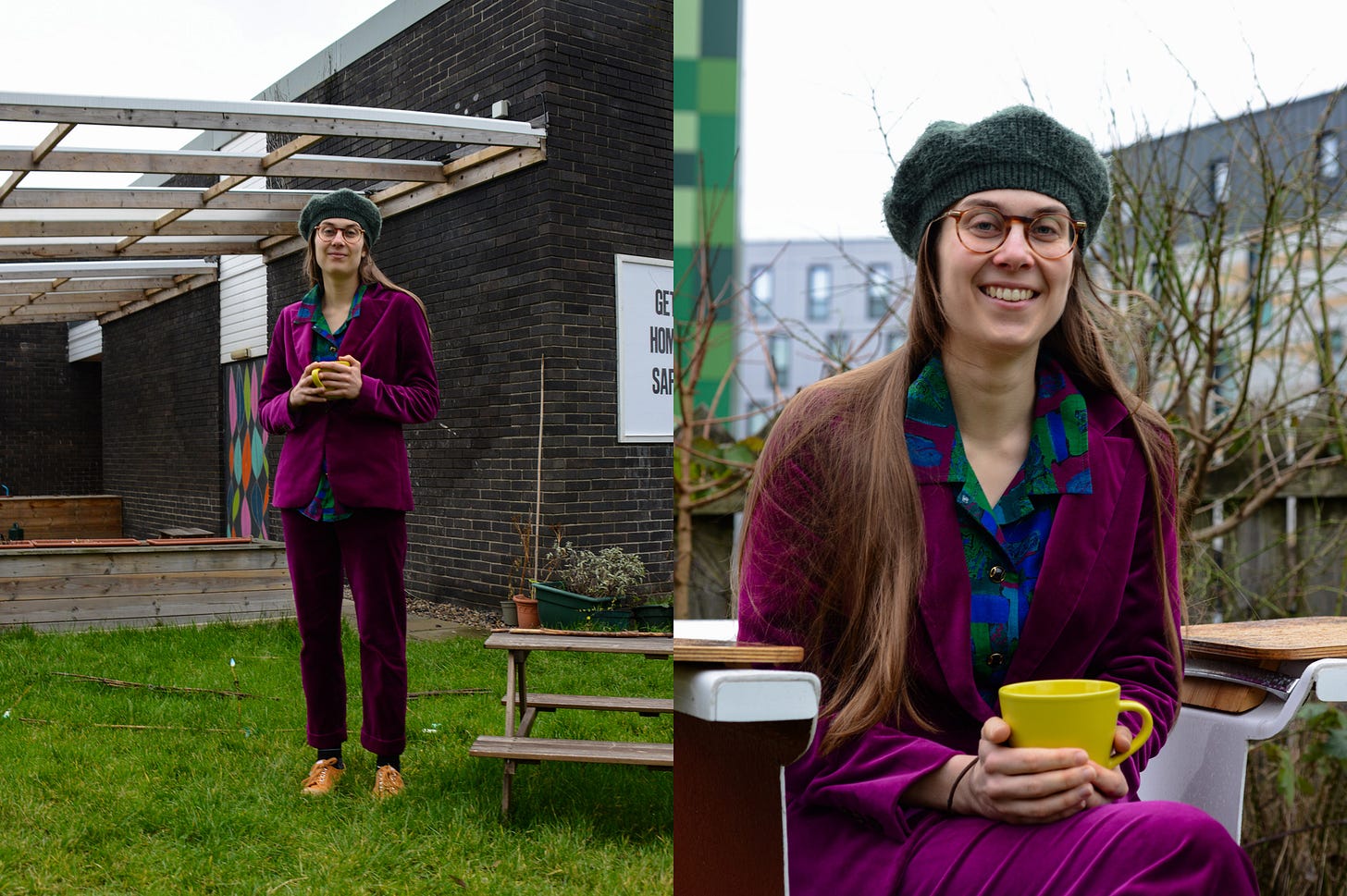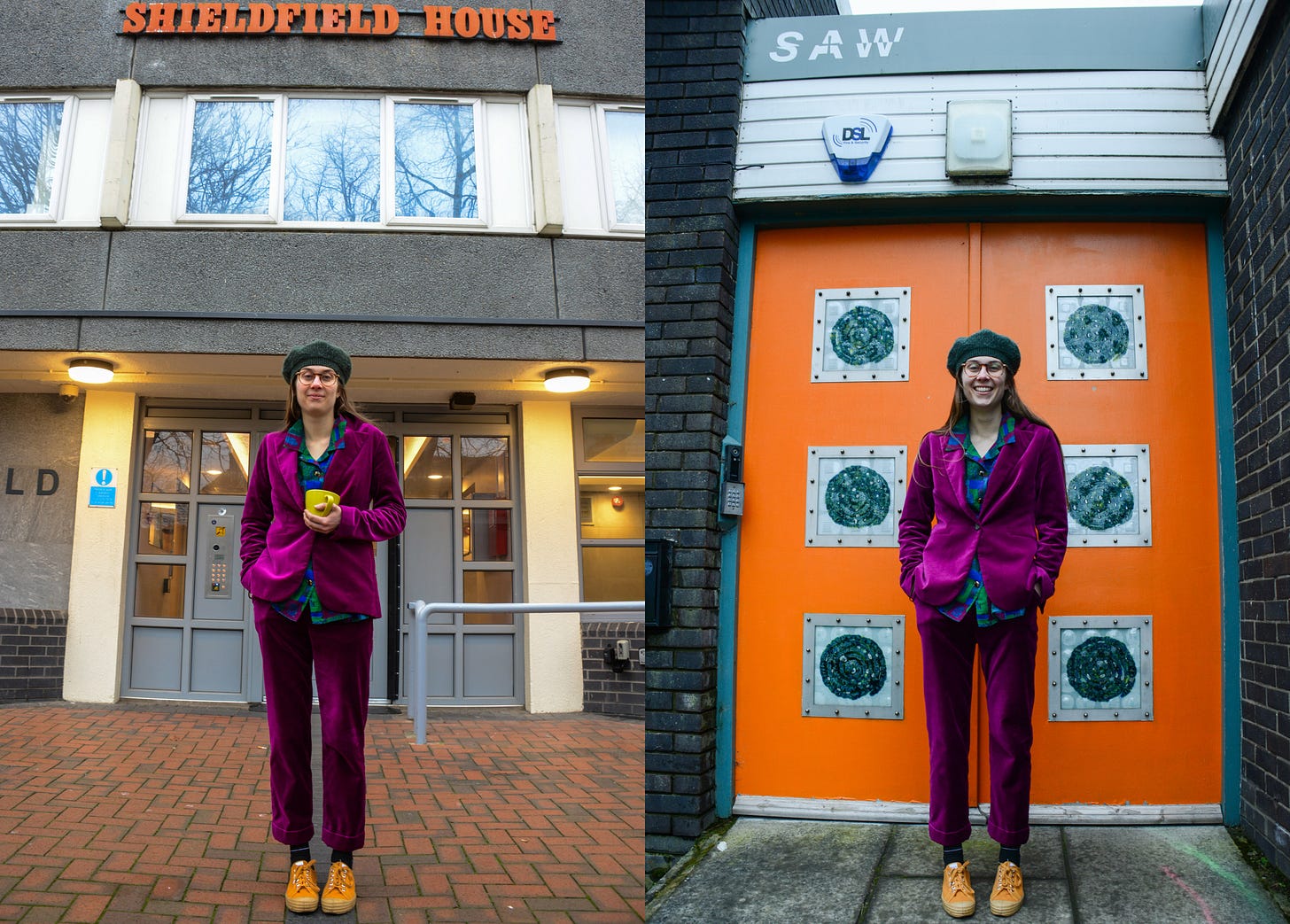Expanding our ideas of hospitality
In her own words: Lydia Hiorns, from Shieldfield Art Works, on hospitality as a way of life.
5 min read | This post is adapted from the final issue of Passio Magazine: our limited print edition which came out twice a year. You can order a copy, and most back-issues, in our shop.

Lydia Hiorns is the Director of Shieldfield Art Works, an arts organisation based in Shieldfield, Newcastle upon Tyne. SAW presents art exhibitions, events, workshops and publications throughout the year: from painting and craftivism to a hub for gardening knowledge.
SAW are grass-roots to the core, led by the residents, and open-handed with this space that they have in the community. Along with many other partner organisations, they have certainly played a part in a remarkable resurgence of community belonging in the last decade, despite the twin challenges of deprivation and gentrification.
Lydia is an artist in her own right, with a particular focus on the art and practice of hospitality—not just as a momentary act, but as a way of life. She draws heavily and explicitly on her Christian faith, although SAW works outside those boundaries. We spoke to Lydia about her approach and experience, and drew out our favourite parts of the conversation, below.
Hospitality isn’t just something theoretical. What inspires me is that Jesus came incarnate; he was embodied, he was flesh; he got messy with people, in a very real way. We’re very physical beings, and often we understand things better when we are physical, like the Lord’s Supper, or Baptism. I would say hospitality is the same; it needs to be lived out in an embodied way.
Hospitality is much broader than just ‘entertainment’. It’s more than inviting people into a home environment where you’re comfortable, or the power play of ‘I am the host, you are the guest.’ Hospitality comes from hospes, which means stranger. When inviting a stranger into your home, there is going to be cost involved. You’ve got to develop that relationship with trust almost instantaneously. Likewise, God’s hospitality—his vulnerability, in taking on flesh—was very costly, vulnerable to the point of death.
We have a God of interruptions; It’s important not to be so busy that we can’t notice the interruptions in the people God puts in front of us. Rosaria Butterfield asks: do you allow people to come in and rearrange the furniture in your home? Do I let people into my heart and allow them to rearrange the furniture? That grows a level of compassion into making room for others.
Even in going to church, I often fear I don’t have enough energy or charisma to be there; everytime I go, I pray to God to give me compassion for those in front of me.
People here often feel they have no power to make a change in their local area. Shieldfield is a small community of houses and high-rises, owned by the council; now completely surrounded by student accommodation. There’s a constant fear that the council will sell land or a community space for a quick quid. Many of the services are gentrified: there were 19 pubs, now gone. The social club’s been taken out. There’s fear around the doctor’s and the nursery disappearing.
“We’re trying to change our language... rather than talking about deprivation, talk about what’s already here, and what we want to grow.”
How would you feel if that’s where you lived? They’ve held forums for local residents to give their opinions, but often things aren’t followed up. Under Section 106, developers are meant to give back money to the community for any negative effects they’ve had—but at least some of that money has been given to a nearby space, Heaton, which is a much more middle-class area.
Researchers often come into Shieldfield, and extract research, as it were. Residents never actually get to see it, so we are determined to do things differently. We work with an organisation called Dwellbeing Shieldfield who conduct ‘participatory action research’ — ie. research, education and action done with people, not on them; and it’s focused on the idea of social transformation.
All our work is super collaborative; we collaborate with residents and many other organisations in the area. Our exhibitions, too, are collaborative and based around local issues. People are the medium of the work; a panel of local residents developing briefs for artists, for example, or deciding what to do with the green space around the building.
Eight years ago, the rhetoric in the area was ‘we’ve been left behind, we can’t make change’. Any meetings I went to, I came away thinking that people feel there’s nothing here for them. I couldn’t tell you all the reasons that’s changed, but now there is so much vibrancy here; there are people proud to live here, and so much going on. I’ve seen friendships grow across cultures and across generations, which I think is less and less common. We’ve even seen neighbours of very different political standing becoming friends, and understanding one another. People know a bit more how to make their voices heard, and how to access people in power: or on the other hand, how to go for it and make change regardless.

Often the language of funding bids is to talk about the ‘needs’ of the area, on a very short-term basis. We’re trying to change our language to also talk about the assets and the skills that individuals in the area have.1 Rather than talking about people in a deprived way, talk about what’s already here and what we want to grow. And what would it look like to have a twenty, or fifty-year vision for how we, and local people, want the place to develop? One of our collaborators posed the question: what if the six-year-olds currently in our youth group can be leading that group in twenty years’ time?
I hope that the Biblical idea of Jubilee land is somewhat prophetic to what’s happening here. That principle was not just about letting the land rest [every 50 years], but also that the people get to reclaim the land that was taken from them. The idea of limitations on the market exists because place matters to God. I think it’s Walter Brueggemann who says that the sense of place is a primary concern of this God who refused a house—choosing a tent over a temple—and the crucified one who has nowhere to lay his head.
People here know a bit more how to make their voices heard, and how to access people in power: or on the other hand, how to go for it and make change regardless.
Some people are more natural at welcoming others. Mary is more natural at welcoming Jesus into her heart; Martha more natural at welcoming him into her home. For me, I’m quite a people pleaser; I want people to feel comfortable, but sometimes I don’t know what questions to ask.
What I’m praying for is to grow more like Christ, to have compassion for the person in front of me, and curiosity for people. And I think anyone can develop that, whether you’re comfortable with ‘hosting’ or not. It’s not about being the best host on the outside; it’s about nurturing compassion, a welcome in our hearts towards God and others.
Hospitality can be about being a ‘guest’, too. Are you usually in the host role or the guest role? Might somebody be empowered to be put in the host role? That’s what Jesus did in the Zaccheus story - nobody would’ve wanted to eat with him, and being empowered to be a host brings about a heart change. So now I very much want to have a balance of host and guest roles.
All that we have is God’s. If we have an abundance mindset, we can give with what we have. Henri Nouwen said ‘We can only perceive a stranger as an enemy when we have something to defend’.
Hospitality is not just for the middle class: we’re all called to it. That will look different in different contexts, but we are called to use the resources that we have. Also, if you live hospitably within a community setting—as we should, in church—then different people’s skills and resources can enable it to be done communally.
Some of the most profound hospitality I’ve experienced, though, was within different cultures. There is a lady I know here in Shieldfield, who’s from Sudan: she’s a model of constant abundant giving, out of not very much. It always reminds me of the gospel story of a lady who gave all she had, despite having little in material terms.
Lydia Hiorns was speaking to Chris Donald.
Find out more about SAW here, and pick up a copy of Passio Magazine Issue 15 here while stocks last.
Also known as ‘ABCD’ or Asset-Based Community Development.




